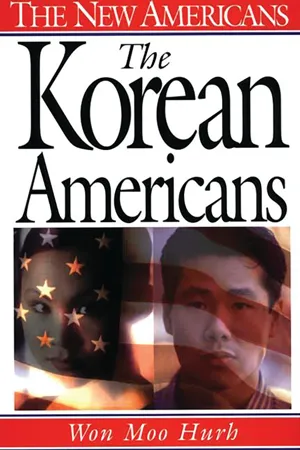The Korean Americans
About this book
Korean Americans are one of the fastest growing ethnic groups in the United States. Although they share many similar cultural characteristics with other Asian Americans, the Korean Americans are unique in terms of their strong ethnic attachment, extensive participation in Christian churches, heavy involvement in self-employed small businesses, wide geographic dispersion in settlement, and the emergence of the 1.5 generation phenomenon. This book answers the following questions for the student or interested reader:
• Who are the Korean people?
• Why did they come to the United States?
• How did they adapt to their new country?
• How are they received by the majority of Americans?
• What are their accomplishments, problems, and contributions to American society?
Other special features include:
• An extensive coverage on the ethnic background (history, language, religion, customs, and other cultural heritage) of Korean Americans.
• Current statistical data on Korean immigration to the United States.
• A comprehensive analysis of socioeconomic characteristics of Korean Americans as compared with those of other minority groups.
• A succinct analysis of the unique characteristics of Korean Americans.
• Effective use of personal narratives. In 1970 there were about 70, 000 Korean Americans—the number grew tenfold to about 790, 000 in 1990. The Korean American population is now estimated at well over a million, and demographic projections indicate that the number will reach about three million by the year 2030. Korean Americans are thus among the new groups of Americans to become another integral part of the American history of cultural pluralism and ethnic diversity. Examined are the most significant areas of Korean American's adaptation—economic adjustment, sociocultural adaptation, family life, ethnic associations, intergroup relations, and psychological adjustment. In each area of adaptation, positive attainment as well as the problems of adjustment are analyzed in light of current theories and empirical research. The book concludes with a discussion of the unique characteristics of Korean Americans and their impact on society.
Tools to learn more effectively

Saving Books

Keyword Search

Annotating Text

Listen to it instead
Information
Table of contents
- Contents
- Illustrations
- Series Foreword
- Preface
- PART I: BACKGROUND
- PART II: COMING TO AMERICA
- PART III: ADJUSTMENT AND ADAPTATION
- PART IV: CONCLUSION
- Appendix: Notable Korean Americans
- References
- Further Reading
- Index
Frequently asked questions
- Essential is ideal for learners and professionals who enjoy exploring a wide range of subjects. Access the Essential Library with 800,000+ trusted titles and best-sellers across business, personal growth, and the humanities. Includes unlimited reading time and Standard Read Aloud voice.
- Complete: Perfect for advanced learners and researchers needing full, unrestricted access. Unlock 1.4M+ books across hundreds of subjects, including academic and specialized titles. The Complete Plan also includes advanced features like Premium Read Aloud and Research Assistant.
Please note we cannot support devices running on iOS 13 and Android 7 or earlier. Learn more about using the app
